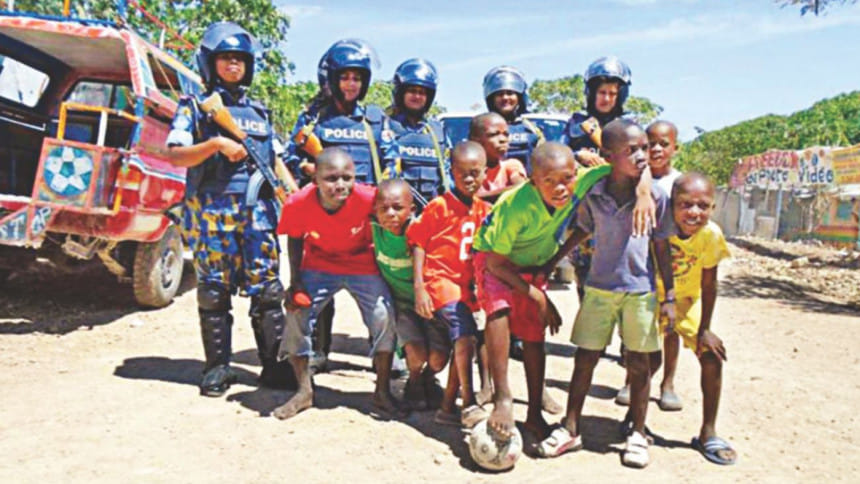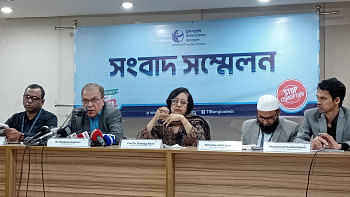Kudos to our soldiers

As the UN prepares to celebrate the International Day of United Nations Peacekeepers on May 29 this year, Bangladesh will be completing more than two decades of experience in peacekeeping. This day pays tribute to all the men and women who have served and continue to serve in UN peacekeeping operations, expressing gratitude for their professionalism, dedication and courage for the cause of peace. It is also the day to honour and remember the heroes who lost their lives in their attempts to establish peace.
May 29 marks the anniversary of the UN peacekeeping mission which began in 1948 with the creation of the United Nations Truce Supervision that was formed with the goal to monitor the ceasefire after the 1948 Arab Israel War. Till April 2016, 3,400 military, police and civilian personnel have lost their lives in the service of peace as a result of acts of violence, accidents and disease. The average rate of fallen soldiers per year is 50, indicating that on average around four peacekeepers lose their lives every month.
Bangladesh started its peacekeeping mission journey by sending 25 brilliant officers to the Iran Iraq Military Observer Group (UNIIMOG) in 1988. General Hossain Muhammad Ershad, the then president of Bangladesh, took the initiative of selecting the best army officers of Bangladesh to undertake the challenge. The current CAS of the Bangladesh Army was one of the members of the first peacekeeping group. Their work got momentum with the rotation of another group of officers led by late Lieutenant Colonel Shabab Ashfaque, who was able to draw the attention of key policymakers of the United Nations Iran-Iraq Military Observer Group (UNIIMOG) and the Iraqi Liaison Headquarters. With time Colonel Shabab proved to be indispensible and became a highly regarded officer by the Chief Military Observer (CMO). As a result, Colonel Shahab would always be nominated as the conducting officer during every high ranking visit from the UN headquarters. This allowed him the opportunity to closely interact with the then Under-Secretary General responsible for peacekeeping operations, whom he convinced to give Bangladesh the chance to participate in peacekeeping missions at the top level. He also managed to get consent from the liaison headquarters of the host country, Iraq, a prerequisite for the initiation of any kind of peacekeeping operation.
As the tenure of the top leadership of the then UNIIMOG came to an end, Bangladeshi UNMOs came to know of the appointment of another dynamic officer of the Bangladesh Army, Brigadier General Shahedul Anam Khan, who was chosen as the Chief Military Observer to lead the entire multinational UNIIMOG. The CMO's appointment was a remarkable milestone for Bangladesh in the peacekeeping sector, as it boosted the morale of Bangladeshi officers and earned special respect from UN military observers of other countries. Veteran peacekeepers from experienced peacekeeping nations also began to count us as a professional group of peacekeepers. This motivated Bangladeshi UNMOs to go the extra mile to strengthen their position in the UN peacekeeping system. The new CMO worked day and night, visited all the team sites in Iraq and Iran, and quickly grasped the situation, driving the UNIIMOG operation to new heights. However, the mission could not continue for long because of Iraq's invasion of Kuwait, and ultimately, the UN had to suspend its operation there for the time being. But the impression that was created by these pioneers under Brigadier Khan's leadership paved the way for future UN peacekeeping observer missions of Bangladesh.
The chance to prove the ability of Bangladeshi soldiers came in 1992 with the deployment of Minor Tigers in Cambodia. Lt Col (later Brig Gen) Kamaluzzaman, the only ranger from the Bangladesh Army, led the battalion, before which he trained the peacekeeping soldiers at the Rangpur Garrison to prepare them for the first ever peace mission at the battalion level. His prudent Operations Officer, Major (later Colonel) Ahmed Ullah Imam Khan, gave him equal support to carry out the operations. With no experience of mounting a peacekeeping mission at the battalion level, the unit faced tremendous challenges from the very beginning. Nothing was streamlined, everything was new and no one knew what was to be done at that critical moment. Troops were without pay and insufficient logistics for months. Indiscriminate firing and shelling at different Bangladeshi camp locations by Khmer Rouge guerrillas was a routine affair. One soldier was killed, and Major (now Brigadier) Tamim sustained a splinter injury to his stomach at the very outset of the operation. It was a real test of patience, courage and leadership to perform the UN mandated tasks in a war-like situation overseas for the first time. Colonel Kamal was a cool-headed leader, a man of high esteem and a determined soldier, who gave firm leadership to his battalion to pass this test of time.
In addition to routine operation activities, Colonel Kamal directed his second-in-command Major Delwar (later Lt. Colonel Delwar who died in the BDR carnage) to utilise his vast experience of serving in the Chittagong Hill Tracts to undertake pacification programme which could complement the unit's operation activities to earn the confidence of the local population, whose support was vital for establishing lasting peace in Cambodia. The pacification programme addressed many of the basic needs, like health, hygiene, sanitation, malnutrition, anti malarial precaution, medical campaign, construction of small culverts, refurbishing schools, family size water filtration plant etc, of the poor population. The Bangladesh Battalion became a role model through their pacification work, and their model is being followed till date in almost every peacekeeping mission to assist distressed and displaced populations to return to normal life.
Since the deployment of UNMOs in Iraq, and the deployment of the Bangladesh Battalion in Cambodia, the country has never looked back, as it became one of the first choices by the UN for future peacekeeping missions. At one time, Bangladesh was the largest troops contributing nation to UN peacekeeping operations. In spite of the closure of a number of successful missions, Bangladesh still contributes 7,200 peacekeepers for missions, which is testament to the country's commitment to international peace and solidarity.
But Bangladesh's journey in UN peacekeeping missions was not without difficulties and setbacks. As mentioned before, we have lost many peacekeepers in these missions. The tragedies of Benin, Congo, Bosnia, Namibia, Ivory Coast, etc, remain vivid memories. As of today, we have lost 128 peacekeepers, of which 27 were officers. They were all distinguished officers and soldiers in their respective fields. They never stepped back from their call of duty. They sacrificed their lives and upheld the flag of Bangladesh in these foreign missions.
Our women soldiers are also not far behind. They participate equally in peacekeeping missions, alongside their male counterparts. So far, 1,047 women peacekeepers have participated in UN missions. Currently, 207 women members of the Armed Forces and police have been deployed in several countries. Our women police peacekeepers have earned respect for Bangladesh, establishing that they are equally competent in such missions.
Though Bangladesh has a vast experience in peacekeeping, the shifting trend of the international order has affected the character of peacekeeping operation. Modern peacekeeping has become more demanding, vibrant and involves risks. The dimension of threat has multiplied to such an extent that peacekeeping has become a serious concern for the UN. Bangladesh needs to continuously update itself with the changing international trends, equip and train its peacekeeping forces to face the diversified challenges to maintain the hard earned image it has achieved. That is how we can truly pay tribute to our gallant peacekeepers.
The writer served as an UN Military Observer in Iraq and led a Bangladesh Battalion in Ivory Coast as Contingent Commander.

 For all latest news, follow The Daily Star's Google News channel.
For all latest news, follow The Daily Star's Google News channel. 



Comments